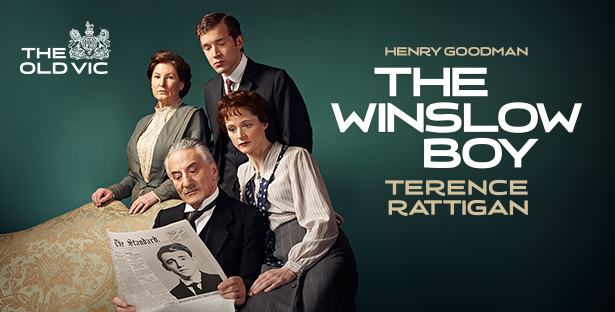Fighting for justice: “let right be done” – The dramatic case of The Winslow Boy
The passion for justice is something that runs from generation to generation. It is the writing that permeates the stick of rock that we call society. Even when it isn’t there, perhaps especially when it isn’t there, its absence makes its presence felt. Today we take the right to a fair trial for granted. Magna Carta,… Continue reading
The passion for justice is something that runs from generation to generation. It is the writing that permeates the stick of rock that we call society. Even when it isn’t there, perhaps especially when it isn’t there, its absence makes its presence felt.
Today we take the right to a fair trial for granted. Magna Carta, the Bill of Rights, the European Convention. And yet, we are never closer to losing it, than when we assume it won for ever.

This play, this case, is about the loss, or alleged loss, of a postal order to the value of 5/- (five shillings). One wonders how many of the encouragingly youthful audience at the theatre can tell a shilling in Terence Rattigan’s 1946 play from a groat in one of Shakespeare’s. Or a postal order from a bill of right.
An Edwardian drawing room drama – floral hats, long dresses, tailcoats and a wind-up gramophone: the accoutrements of datedness could never have been so omnipresent, so overpowering. And yet Lindsay Posner’s production of The Winslow Boy and the marvelous vitality of all the performances make this story seem as real and as urgent and as crucial as any case from today’s law reports.
I saw the movie (the original 1948 one, directed by Anthony Asquith), long ago, at school, and afterwards could never remember whether, in the end, the boy done good or ill. But I saw it as a boy and all I saw was the boy. Now I see it as a father and the play is all about the father, about his vain and foolish and stubbornly unpragmatic fight for justice.
Motivated by some selfish gene, he all but throws away the peaceful enjoyment of family life, and the well-being and happiness of the rest of his family, in a reckless bid for the vindication of the name of his barely interested teenage son. It’s vindication of the father that’s really at stake; but not just of him: vindication of everyman, his right to a fair trial, to be judged not by a coldblooded establishment, not swept under the carpet of institutional convenience, but given the right to a verdict from a fair tribunal. From a court.
So what’s it all about?
The story is set in Edwardian Britain on the eve of the First World War. A 13-year-old boy (Ronnie Winslow) is expelled from the Royal Naval College, Osborne, Isle of Wight, having been accused – he says wrongly – of stealing a postal order to the value of five shillings (25p in today’s decimal currency, but a substantial sum of money in those days). His father, Arthur, is furious and immediately sets about trying to clear his name. But the Royal Navy refuses to reconsider the matter; and, as an emanation of the Crown, is not amenable to the jurisdiction of the court. Nor, as a mere cadet, would Ronnie be entitled to a court martial hearing. Arthur’s only recourse is to apply for a petition of right, under the Petitions of Right Act 1860, which, until the Crown Proceedings Act 1947, was the only mechanism by which citizens could sue the Crown. It required a petition to be addressed to the Home Secretary, who, on the advice of the Attorney General and with the consent of the government, could issue a document on which the words “Fiat justicia” (“Let right be done”) appeared alongside the monarch’s signature. As Carl Cardner points out in his Head of Legal blog review of the play, this was akin to the modern procedure of judicial review. And it is this hearing (rather than any actual criminal trial) forms the basis of the courtroom drama.
Terence Rattigan’s master stroke in writing the play is to set the whole thing in the Winslow’s drawing room. In the traditional theatre of the Victorian and Edwardian period, the drawing room is a symbol of family life. And this is very much a story about a family. The Winslows are reasonably prosperous but certainly not rich upper middle class people. Arthur is a retired banker; he and his wife Grace have three children, an older son (Dickie) at Oxford, a daughter (Catherine) who is a suffragette, and the boy Ronnie who has done well to get into the naval college at Osborne. They have a maid (Violet) and a cook and before Catherine’s engagement to a young officer is announced, he and her father have a decidedly unsentimental discussion about their respective means and the sort of settlement the young couple can expect.
All that, however, has to go by the board once Arthur embarks on his stubborn fight for justice. Though they ultimately win the battle, each member of the Winslow family sacrifices something significant. Catherine’s officer, goaded by his far more establishment-minded father, breaks off their engagement. Dickie must give up his allowance and his place at Oxford and get a job. Ronnie moves to a much less prestigious school (they are lucky to find one that does not ask too many awkward questions). And Arthur, who begins with a walking stick and ends confined to a bath chair, is broken in health and fortune.
The point is that even this reasonably prosperous well educated and well positioned middle class family (not unlike the Bankses in Mary Poppins) can be treated like a mere insect to be crushed by the imperial and impersonal might of the state. So it’s a David and Goliath battle, in which the little man ultimately wins.
By enacting all the drama in the drawing room, the very hearth of this family home, Rattigan takes a daring risk. He gives up the opportunity, which a less confident playwright would surely have exploited, of staging his court room scene in a court room. Instead, he brings the court room into the heart of the family home, in the person of Sir Robert Morton KC, the coldly ambitious barrister who eventually decides to take on their case. Sir Robert visits the Winslow home just before the interval, ostensibly in order to discuss the case with Arthur, but in reality so that he can have an opportunity to cross-examine the boy Ronnie and test the strength of his case. The scene is a brutal one, as Sir Robert, who is supposed to be on their side, grills the boy to tears, trapping and confusing him with machine-gun questions. The rest of the family, gathered around the drawing room, look on aghast. And yet, the minute it’s over, and Ronnie is collapsed in a heap, Sir Robert briskly declares that of course the boy is innocent and of course he’ll take the case.
(No nonsense about the Cab Rank rule for Sir Robert.)
It’s a dangerous gamble, playing this court room scene in the drawing room, just before the interval, because there’s a risk that nothing in the second half will quite match this dramatic climax. And it never quite does, though there are twists and turns and revelations (mostly revelations about people’s true character, when tested and found, in some cases, wanting; in others, triumphantly, not). The day-long debate of the cause célèbre in the House of Commons is brought into the drawing room in the form of newspaper reports and the coming and going of witnesses who were there, but it doesn’t have quite the same impact. We can see how things fall apart, as the case drags on, how it takes its toll on the various family members; and then, quite suddenly, it’s all over. The admiralty runs up the white flag and concedes the case; Sir Robert accepts the compliments of the family with awkward hauteur: but he’s a bit of a Mr Knightley. Cross-examined by suffragette Catherine, he almost admits to a sneaking regard for her unconventional ambitions. You sense there might be more than a negligible chance of something blossoming between them, something rather more than with the stodgy family solicitor who dotes on her with hangdog hopelessness.

True to law, true to life?
The story is based on a real case, though some of the details have changed. There really was a boy of 13, accused of stealing a postal order for five shillings, but the boy’s name was Archer-Shee and it happened a few years earlier than as set in the play. The suffragette sister and playboy brother seem to have been invented; in reality, the brother was much older and already an MP by the time of the case, which he was instrumental, together with their father, in pursuing. In the play, Dickie can’t quite see what all the fuss is about, it’s the sort of scrape (a bit of pinching) his chums wouldn’t turn a hair over. But in the eyes of Mr Winslow, the charge against Ronnie is something which, if it sticks, will scar his reputation for the rest of his life.
At the time Rattigan wrote the play, the petition of right was already a creaky legal anachronism, about to be swept away by the Crown Proceedings Act. It now resembles one of those medieval pleas which it was so important to get absolutely right, like a latinate spell out of Harry Potter.
But in other respects, it is hard to regard the law as having developed an easier access to justice. As John Morrison points out in a piece in the theatre programme, it took the Archer-Shees two years to get justice done; but the families of the Hillsborough disaster victims waited more than two decades to see their claims of a police cover-up vindicated, while Doreen and Neville Lawrence are still waiting for all the killers of their son Stephen to be finally brought to justice.
Since the middle of the last century there has been a gathering crescendo of cases of judicial review, in which every kind of governmental and administrative action has been questioned and often found wanting by the courts; and yet public authorities, in the name of terror or data protection or health and safety, continue to find ways of behaving like the Admiralty in the Archer-Shee case and putting up the shutters to justice.
So the themes of justice delayed, justice denied, and justice finally done are no less valid now than in 1913 or 1946. Sir Robert Morton in the play, complimented on the passion with which, it is assumed, he must have fought to win, rebukes the compliment by saying it is not passion that wins cases, but “cold clear logic”. He adds that “It is easy to do justice, but it is very hard to do right”. Meaning, presumably, that “justice” is the law as it is, whereas “right” is as it should be. Hence the motto that runs through the play, “Let right be done”.
